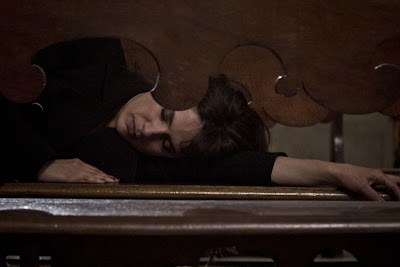Attention, please: For anyone who savors the English language in all its succulent, incisive, trippingly-off-the-tongue glory, Stephen Fry -- one of the great humorists of our time -- is back with an adaptation of his comic novel THE HIPPOPOTAMUS, brought to the screen by director John Jencks and a quartet of writers that includes Blanche McIntyre, Tom Hodgson, John Finnemore, and Robin Hill. It is, from first scene onward, a non-stop delight, one that Mr. Fry himself calls, "Frankly terrific. In fact, probably better than the original source material."
Not having read the novel (TrustMovies knows Fry best from his film and television work), I can only say that Mr. Jencks (shown at right) and his crew have captured Fry's sense of humor -- quirky, mad, inclusive, smart, satirical, and hugely funny -- quite well, and have managed to tell a rather complicated tale of mystery and miracles, life and death, creativity and sensuality, desire and need extremely well, drawing fine performances from a cast that includes actors both known and not-so on these shores, and a great one from the movie's leading man, Roger Allam, below, who would immediately become an "Oscar" contender in any just universe.
Mr. Allam portrays a "blocked" poet named Ted who has now morphed into a slovenly, cynical theater critic. One of the movie's early and juiciest scenes discovers him, drunk (as near-usual), sitting in a London theater observing a truly awful performance of Shakespeare by a no-talent director and his cast (shown below, chosen clearly for its looks and maybe fame, certainly not for its talent) that Allam's character rightly, loudly and vociferously -- in the very best Queen's English -- boos off the stage. This scene is so funny, shocking, intelligent and deserved that it immediately becomes a "classic."
This would include some folk we've often seen, for instance the wonderful Fiona Shaw (below, right, with Allam) and John Standing, along with some actors new to us but sure to be seen again soon, such as
a young fellow by the name of Tommy Knight (below), who plays a relative who may be key to these "miracles," and a young actress named Emma Curtis, who just might become the new subject for our miracle worker.
Along for the ride are such fun actors as Tim McInnery (below, left), playing an over-the-top theater director with major health problems, and Lyne Renee (below, right), in the role of Ms Curtis' sexy mother. Everyone from Russell Tovey to Geraldine Somerville to Matthew Modine make appearances here, and they're all just fine.
But mostly it's Mr. Allam, with his spot-on delivery of Mr. Fry-and-adapters' delightful dialog, that makes this movie such an amazement. You, as were we, are likely to come away from The Hippopotamus with a renewed appreciation of the English language -- and what can be achieved with it by folk who really know and care about what they're doing.
From Lightyear Entertainment and running a lean 89 minutes, the movie -- after playing around the country on the theatrical and "special engagement" circuit (two of its final stops are here in Coconut Grove and Naples, Florida, this coming Monday, July 31 at the Silverspot Cinemas) -- will make its debut on Blu-ray, DVD and Digital this Tuesday, August 1, for purchase and rental. However you choose to view, do make sure you see it.
Note: Once you've viewed the film, be sure to watch the wonderful Q&A included in the Blu-ray's Special Features (and as part of the theatrical program, too). It features actor Allam, the film's director and lead writer, and Stephen Fry himself. What they all have to say about the filmmaking process, transforming a novel into a movie, creativity, and how things get done (or don't)
is very nearly as delightful and edifying as the film itself.























































